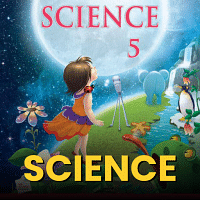Class 5 Exam > Class 5 Questions > Pick the correct option.a)Solids can freezeb)...
Start Learning for Free
Pick the correct option.
- a)Solids can freeze
- b)Liquids can freeze
- c)Gases can freeze
- d)All of the above
Correct answer is option 'B'. Can you explain this answer?
| FREE This question is part of | Download PDF Attempt this Test |
Most Upvoted Answer
Pick the correct option.a)Solids can freezeb)Liquids can freezec)Gases...
Explanation:
Solids can freeze:
- Solids are one of the three states of matter, along with liquids and gases.
- Freezing is the process in which a substance changes from its liquid state to its solid state.
- When a solid freezes, the particles in the substance slow down and come closer together, forming a rigid structure.
- This can be observed in everyday life when water freezes and turns into ice.
Liquids can freeze:
- Liquids are another state of matter, and they can also undergo the process of freezing.
- When a liquid is cooled, its particles slow down and come together, forming a solid.
- For example, when water is cooled below its freezing point (0 degrees Celsius or 32 degrees Fahrenheit), it freezes and becomes ice.
Gases cannot freeze:
- Gases, on the other hand, do not freeze in the same way as solids and liquids.
- Freezing is the process of changing from a liquid to a solid state, and gases do not have a liquid state.
- Instead, gases can undergo a process called condensation, where they change from a gaseous state to a liquid state when cooled.
- However, it is important to note that gases can be converted into a solid directly through a process called deposition, skipping the liquid state.
Conclusion:
- Based on the above explanations, the correct option is 'b) Liquids can freeze'.
- Solids can also freeze, but it is not the only correct option.
- Gases cannot freeze, but they can undergo condensation or deposition to change state.
Solids can freeze:
- Solids are one of the three states of matter, along with liquids and gases.
- Freezing is the process in which a substance changes from its liquid state to its solid state.
- When a solid freezes, the particles in the substance slow down and come closer together, forming a rigid structure.
- This can be observed in everyday life when water freezes and turns into ice.
Liquids can freeze:
- Liquids are another state of matter, and they can also undergo the process of freezing.
- When a liquid is cooled, its particles slow down and come together, forming a solid.
- For example, when water is cooled below its freezing point (0 degrees Celsius or 32 degrees Fahrenheit), it freezes and becomes ice.
Gases cannot freeze:
- Gases, on the other hand, do not freeze in the same way as solids and liquids.
- Freezing is the process of changing from a liquid to a solid state, and gases do not have a liquid state.
- Instead, gases can undergo a process called condensation, where they change from a gaseous state to a liquid state when cooled.
- However, it is important to note that gases can be converted into a solid directly through a process called deposition, skipping the liquid state.
Conclusion:
- Based on the above explanations, the correct option is 'b) Liquids can freeze'.
- Solids can also freeze, but it is not the only correct option.
- Gases cannot freeze, but they can undergo condensation or deposition to change state.
Attention Class 5 Students!
To make sure you are not studying endlessly, EduRev has designed Class 5 study material, with Structured Courses, Videos, & Test Series. Plus get personalized analysis, doubt solving and improvement plans to achieve a great score in Class 5.

|
Explore Courses for Class 5 exam
|

|
Similar Class 5 Doubts
Pick the correct option.a)Solids can freezeb)Liquids can freezec)Gases can freezed)All of the aboveCorrect answer is option 'B'. Can you explain this answer?
Question Description
Pick the correct option.a)Solids can freezeb)Liquids can freezec)Gases can freezed)All of the aboveCorrect answer is option 'B'. Can you explain this answer? for Class 5 2024 is part of Class 5 preparation. The Question and answers have been prepared according to the Class 5 exam syllabus. Information about Pick the correct option.a)Solids can freezeb)Liquids can freezec)Gases can freezed)All of the aboveCorrect answer is option 'B'. Can you explain this answer? covers all topics & solutions for Class 5 2024 Exam. Find important definitions, questions, meanings, examples, exercises and tests below for Pick the correct option.a)Solids can freezeb)Liquids can freezec)Gases can freezed)All of the aboveCorrect answer is option 'B'. Can you explain this answer?.
Pick the correct option.a)Solids can freezeb)Liquids can freezec)Gases can freezed)All of the aboveCorrect answer is option 'B'. Can you explain this answer? for Class 5 2024 is part of Class 5 preparation. The Question and answers have been prepared according to the Class 5 exam syllabus. Information about Pick the correct option.a)Solids can freezeb)Liquids can freezec)Gases can freezed)All of the aboveCorrect answer is option 'B'. Can you explain this answer? covers all topics & solutions for Class 5 2024 Exam. Find important definitions, questions, meanings, examples, exercises and tests below for Pick the correct option.a)Solids can freezeb)Liquids can freezec)Gases can freezed)All of the aboveCorrect answer is option 'B'. Can you explain this answer?.
Solutions for Pick the correct option.a)Solids can freezeb)Liquids can freezec)Gases can freezed)All of the aboveCorrect answer is option 'B'. Can you explain this answer? in English & in Hindi are available as part of our courses for Class 5.
Download more important topics, notes, lectures and mock test series for Class 5 Exam by signing up for free.
Here you can find the meaning of Pick the correct option.a)Solids can freezeb)Liquids can freezec)Gases can freezed)All of the aboveCorrect answer is option 'B'. Can you explain this answer? defined & explained in the simplest way possible. Besides giving the explanation of
Pick the correct option.a)Solids can freezeb)Liquids can freezec)Gases can freezed)All of the aboveCorrect answer is option 'B'. Can you explain this answer?, a detailed solution for Pick the correct option.a)Solids can freezeb)Liquids can freezec)Gases can freezed)All of the aboveCorrect answer is option 'B'. Can you explain this answer? has been provided alongside types of Pick the correct option.a)Solids can freezeb)Liquids can freezec)Gases can freezed)All of the aboveCorrect answer is option 'B'. Can you explain this answer? theory, EduRev gives you an
ample number of questions to practice Pick the correct option.a)Solids can freezeb)Liquids can freezec)Gases can freezed)All of the aboveCorrect answer is option 'B'. Can you explain this answer? tests, examples and also practice Class 5 tests.

|
Explore Courses for Class 5 exam
|

|
Signup for Free!
Signup to see your scores go up within 7 days! Learn & Practice with 1000+ FREE Notes, Videos & Tests.
























